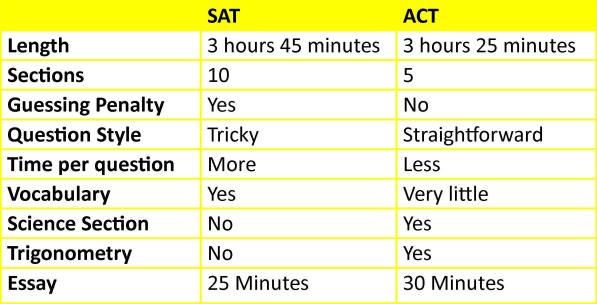CONTACT US
SAT vs. ACT
Starting junior, and sometimes even sophomore, year, students begin to think about colleges and college applications. One big question students ask is, should I take the SAT or the ACT? There is a lot of pressure surrounding this decision, which can make taking the test even more stressful. Don’t be intimidated by these tests. This article will highlight the main differences between the tests and serve as a good starting point for juniors and sophomores.
Traditionally, people on the coasts take the SAT, and people in the middle of the country take the ACT. Don’t feel pressured into taking one test or another because of where you live or what your classmates are taking! Most schools readily accept either test and do not show a preference for one or the other. The question now becomes, what is the difference between the two tests?
Content: The SAT covers three broad categories: critical reading, math, and writing. The ACT tests English, math, reading, and science. There is a large overlap of material, but the two tests do differ in small but significant ways.
- Reading: The SAT focuses more on vocabulary than the ACT. In each critical reading section of the SAT, there are five to eight sentence completion questions that test vocabulary and reasoning. The ACT reading section does not have specific vocabulary questions. Students with a strong vocabulary may want to take the SAT.
- Math: The SAT tests material up through geometry and algebra 2. The ACT covers algebra 2 and geometry, as well as trigonometry. Students who haven’t been introduced to trigonometry concepts should shy away from the ACT.
- Essay: Both the SAT and ACT have essay sections, which differ in length and topic. The SAT topics are broader and more global, which require writing a formal, persuasive piece. The ACT topics are more specific and more relevant to the lives of high school students, which translate to a personal opinion essay. Students who have trouble developing ideas and examples on the spot may find the ACT’s more personal topics easier to work with. The SAT gives students 25 minutes to complete the essay, while the ACT gives students 30 minutes. Students who need more time to write may want to take the ACT.
- Science: The most obvious difference is that the ACT has a science section. Contrary to its name, the science section does not test science facts. Instead, students must interpret data, diagrams, and charts to answer the questions. Students who have trouble rapidly understanding and analyzing scientific data may want to take the SAT.
Question Style: The SAT is more of a reasoning test while the ACT is more of an achievement test. This means that the SAT tests a student’s ability to reason through a problem and find the solution, and the ACT tests how well a student has mastered the fundamental skills taught in school. ACT problems tend to be more straightforward while SAT questions require students to problem solve. Even students who excel in high school sometimes find themselves stumped by the SAT’s cryptic questions. Students who perform strongly in school and can answers questions quickly and accurately may want to take the ACT.
With regard to scoring, the SAT has a guessing penalty, meaning that students lose points for wrong answers but are not penalized for leaving them blank. The ACT does not have a guessing penalty. On the ACT, every question should be answered regardless of whether or not the question has been read. On the SAT, students should only guess if they can eliminate one or more wrong answer choice.
Time Limits: The SAT has 10 sections and lasts 3 hours 45 minutes. The ACT has 5 sections and lasts 3 hours 25 minutes. Because the SAT is broken down into more sections, students focus on a given topic for shorter periods of time. On the ACT, the students have to answer all the English questions at once then all the math questions. Depending on the student, one test may be preferable to the other. Students who can focus for long periods of time should consider taking the ACT.
The ACT contains more questions in less time than the SAT. The ACT reading and science sections are particularly difficult for many students to finish within the time limits. Students who feel nervous under time constraints or who take longer to read and do math problems may want to take the SAT which will give them more time per problem.
So Which Test Do I Take?
Despite these differences, fundamentally the tests are very similar. One test is not inherently easier than the other, so either test is a good choice. Depending on what type of student you are, one test may be a better fit, so be sure to take a practice SAT and a practice ACT. Many test prep companies offer free diagnostic exams to help you decide which test to take. Compare the scores and see which test is better suited to your strengths. Because admission is so competitive, test preparation is essential for either test. If you are looking to maximize your options for college, begin test prep early and take both exams.
Like what you see here? We are happy to permit you to use our material as long as you link back! Please refer to us as the Cardinal Education Blog.
SEE OUR RESULTS
DISCLAIMER
Cardinal Education is an independent educational consulting company. We are not affiliated with or endorsed by any private school, including those mentioned on this website. All school names and trademarks are the property of their respective owners and are used here for descriptive purposes only.

